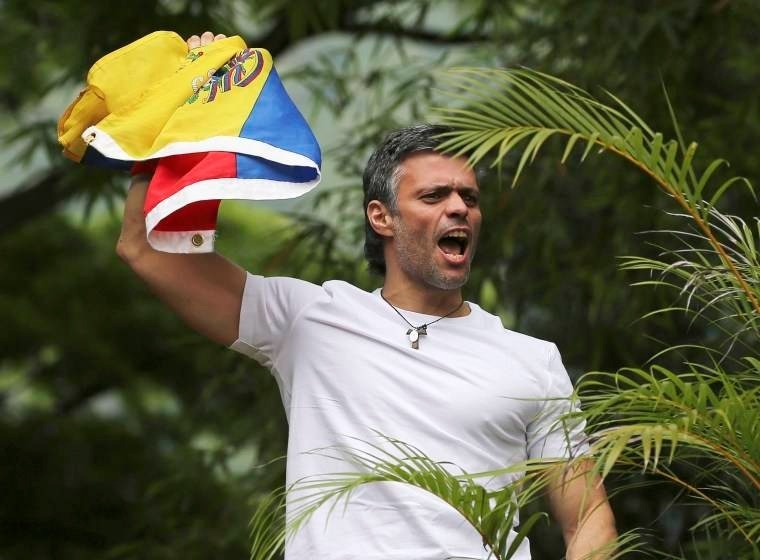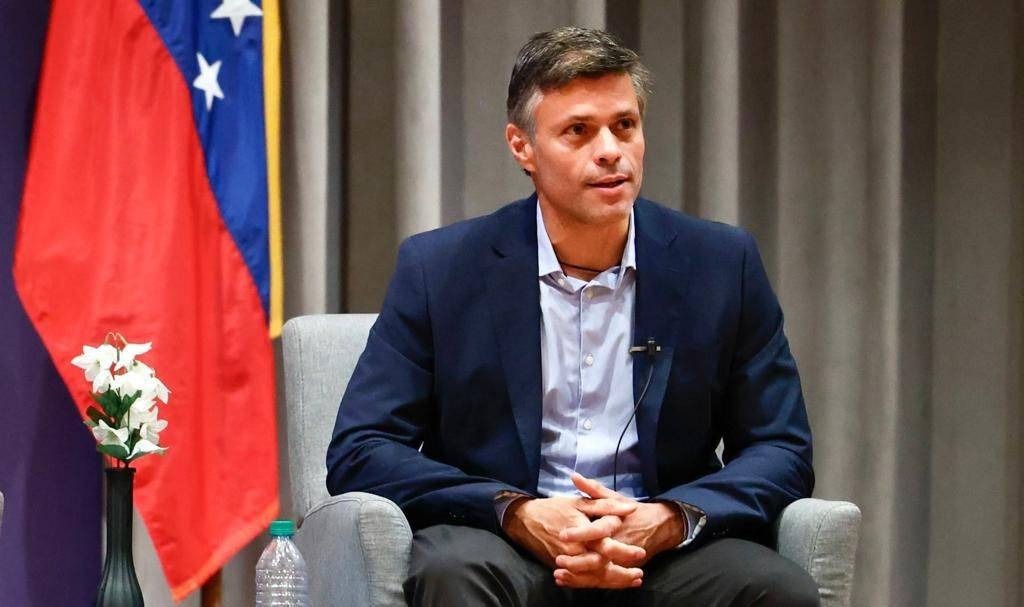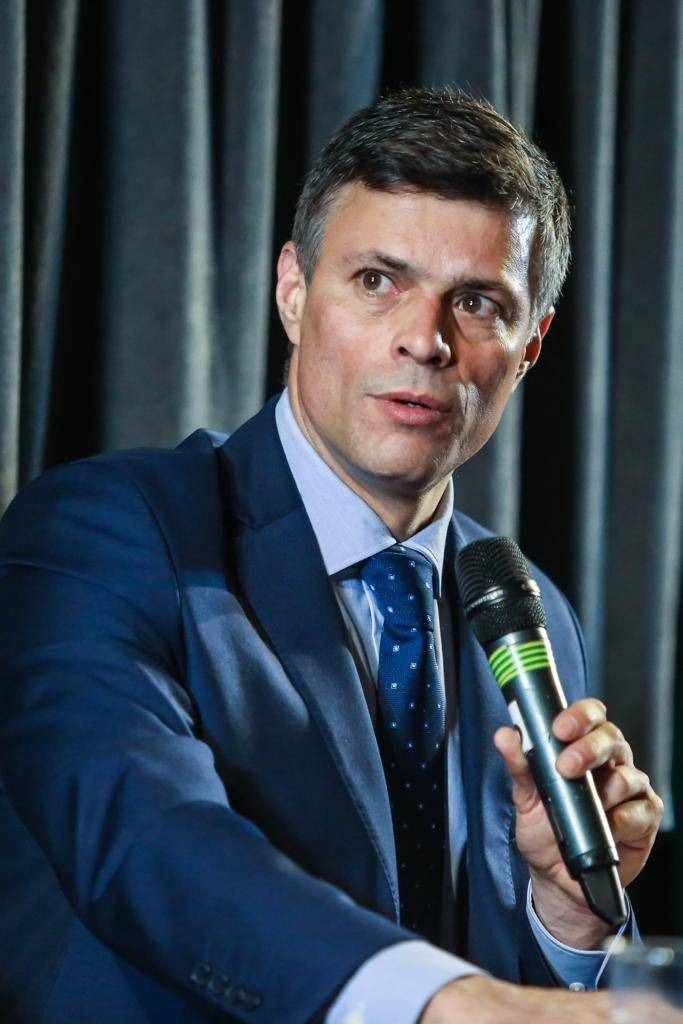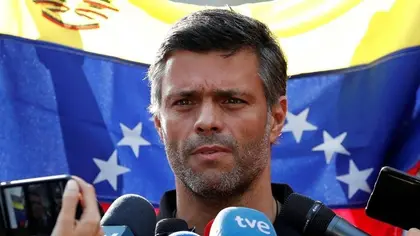The 51-year-old Venezuelan loses no time before unpacking what is on his mind: How to save the world from a criminal network of “kleptocratic autocrats” who are behind not only the war in Ukraine, but also some of the world’s most notorious crimes and ruthless dictators.
According to Leopoldo López, the current leadership of his native Venezuela – like China, Russia, Iran, Belarus, Nicaragua, and Cuba – is part of a large network of dictatorships that have linked together to illicitly make money while maintaining totalitarian power over their countries, despite the often expressed wishes of their citizens for a different path. However, these tyrants are not only a scourge to their own populations, they are also destabilizing the global system.
“The only way to stabilize the world is to promote freedom and democracy,” keeping countries out of the “kleptocratic network that works together to undermine freedom and democracy.”

Masterminding this criminal network, argues the opposition leader, “is Russian President Vladimir Putin.”
Rodrigo Figueredo, an exiled Venezuelan human rights activist says that the fight against Putin and Nicolás Maduro are two sides of the same coin, in that “Maduro and Putin are the same and operate using the same authoritarian dynamic to attack democracy and the free world.”

Putin Signs Law Letting Ukraine Fighters Write Off Bad Debts
A review of sanctioned countries finds that many of the nations López mentions are also among the most sanctioned countries in the world: Russia, Iran, Syria, North Korea, Venezuela, Myanmar, and Cuba.
A former Ambassador of Venezuela’s internationally recognized interim government, Estefanía Meléndez says that the collaboration between rogue regimes gives impetus to why the West should be imposing more sanctions against Moscow and its proxies and opposing attempts to normalize relations, as is now happening with the regime in Caracas. Any attempt to now take the heat off of the Maduro government is tantamount to allowing “Putin to escape some of the economic pressure he is under” and to continuing to “expand Russia’s influence in Latin America.”
Russian opposition leader Garry Kasparov, who for two decades has been an outspoken critic of Putin, is a close collaborator of López, with whom he shares his view that “Vladimir Putin’s rule is a dire threat to democracies everywhere.” The two democrats linked up this past November to hold the inaugural event of the World Liberty Congress (WLC), an organization committed to helping pro-democracy leaders find effective means of resisting dictatorships.
The initial WLC event this past November highlighted that spearheading efforts to break up the international consortium of dictators engaged in gross criminal misconduct is not just daunting, but also risky. Among the attendees at the kick-off in Vilnius was Thulani Maseko, a human rights lawyer from Eswatini (formerly Swaziland).
Three months after the Congress, this past January, two days before Russian Foreign Minister Sergey Lavrov arrived on a state visit to the small African country of Maseko’s birth, the activist-lawyer was gunned down by unknown assailants in front of his family. For months Maseko had been receiving death threats which he attributed to the dictatorship that controls Eswatini.
Stephen Nix, a Washington, D.C.-based lawyer who has worked in pro-democracy movements in the post-Soviet space for over three decades, agrees that the Putin regime has been instrumental in suppressing democratic movements across the globe, not just in the 15 former Soviet republics, saying that “Putin views democracy as a threat to his ability to maintain control in his own country.”
There is another tie that binds oppressive regimes which has been called “the shop to help broken dictatorships”: a team of Kremlin-backed political consultants, military experts, PR wizards, economic advisers, and private military companies who parachute into troubled dictatorial regimes to help challenged autocrats maintain power.
“You hear of Russian support for African dictators via the military, kleptocratic network, economic support, diplomatic support, cyber support, and also the manipulation of social media and other mass communication,” the Venezuelan comments, adding that autocrats are united also, “of course,” by being shareholders “in the drug-trade.”

López, who is incredibly optimistic, despite having spent years as a political prisoner for trumped-up crimes decried by the international community, repeats his hope that “the light of justice will shine on the crimes of Putin,” for being a war criminal on top of his other crimes.
How realistic is it that the international courts will take up the case against Putin?
The youthful statesman retorted that “Maduro is being prosecuted at the International Criminal Court (ICC). However, according to Putin, first ‘we must win the war in Ukraine, then there will be a change in Russia towards democracy.’ In which case, Putin and his henchmen would undoubtedly need to face international justice for their crimes.”
Maduro, a former bus driver, who became the President of Venezuela in 2013 following the death of Putin-allied strongman Hugo Chavez, has been successful in maintaining power, despite phenomenal economic problems domestically “due to the support he receives from Putin.” This assistance “started many years ago with the military and the supply of arms, training, and support to Venezuela – which today is an entanglement of organized crime, diplomacy, and different sectors,” López emphasizes.

The Harvard educated Venezuelan’s views align with many other Latin America-watchers who have observed that “Venezuela is one of the most important pass-throughs for cocaine that is manufactured in Colombia,” and is shipped and traded with the help of “non-state groups – like the Wagner Group,” which “has been instrumental in the narcotics trade.”
The Bolivarian Regime of Maduro has openly boasted that the Western-sanctioned Wagner Group is present in Venezuela. The careful alignment of the world’s dictators is why the opposition leader says that he and his allies are not up against only Maduro, but in fact, “are facing Xi [Jinping of China], we are facing Putin, we are facing the mullahs from Iran – because they are working together and they have created a network of autocratic regimes to expand their sphere of influence globally,” which should be “understood as a global structure of autocrats.” At every turn, these anti-democratic leaders receive the backing of the Kremlin.
What can the West do in the face of a Kremlin that is so fervently hostile to not only democracy, but the rule of law?
“The US should be promoting political and democratic change in Russia,” because “there will be a positive ripple effect across the entire world,” he says.
“It is clear that we all must support the Ukrainians. Since this war began we have prayed to God that Ukraine will win and that this will lead to a path for freedom for many peoples across the world: Ukraine’s struggle is a fight for freedom,” the native Venezuelan insists, continuing that a Ukrainian victory will set off a chain reaction.
“Once Ukraine wins the war and Putin is defeated… it will bring Venezuela closer to freedom and democracy – as the fight for freedom in Ukraine is also the fight for freedom for us in Venezuela,” he affirms.
To achieve this, would López go as far as to say that Washington should back the overthrow of the Putin regime?
“Yes, absolutely. I truly believe so... the downfall of Putin would be in the interest of not only the United States, but of every country: We must beat Putin.”
You can also highlight the text and press Ctrl + Enter






